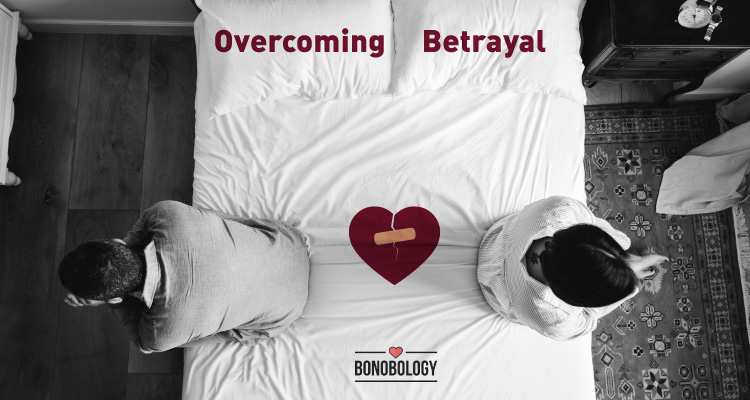Trying to survive infidelity is the last thing on anyone’s mind when their partner’s affair is discovered. Most want to rip off the heads of their partners. A few may be more partial to slow, drawn-out, sadist methods like Amy in Gone Girl. For those who have a healthy respect for the law, separation is the only thing to do after such a devastating experience. Some people may also look for revenge.
Primarily because the rage, shock, and humiliation one feels as the betrayed partner is not easy to go through. If someone wants to forget it all and move on, you can’t blame them. But you also can’t blame someone who may want to push the “Reboot” button and start a new life. To understand the complexity of healing from an extramarital affair, I talked to Dr. Aman Bhonsle (Ph.D., PGDTA), who specializes in relationship counseling and Rational Emotive Behavior Therapy and gained a new understanding of complicated relationships.
Does The Infidelity Pain Ever Go Away?
Table of Contents
Infidelity in the modern context covers not just sexual misconduct outside of relationships but emotional infidelity, cybersex, online cheating, and watching pornography when their partner is uncomfortable with it, as well. The deep pain that comes from infidelity in all of these cases is because of:
- Getting cheated upon can feel like a betrayal in a monogamous, committed relationship
- It can also produce a feeling that only you are responsible for the failure of the relationship
- The revelation can make the betrayed spouse question their reality and identity
- Being cheated upon can affect one’s self-esteem as suggested by research
In research, it was observed that recovery from infidelity may take longer than six months, up to three years. Dr. Bhonsle suggests, “Though different models suggest different timelines for recovery from infidelity, successful recovery from infidelity pain depends highly on the people in the relationship and the relationship dynamic.” However, the pain may not go away completely, but you and your partner can deal with it if you work on it.
Is It Possible To Survive Infidelity?
Yes and no. Research has indicated that infidelity-related stress can produce PTSD-like symptoms. It may feel like the loss of losing someone, since in this case, you’ve lost not just the partner, but a part of yourself before the knowledge of the event. For saving the relationship, the primary factor is forgiveness, which is dependent on the following variables:
- If your relationship was already on the rocks before one of you cheated on the other, there is very little chance of fixing it
- A high level of commitment results in a higher level of trauma, thus reducing the chances of forgiveness in the relationship as suggested by this research
- This research also indicated that the chances of surviving infidelity increase for couples with high differentiation of self, i.e. the ability to distinguish thoughts from feelings. Couples with low differentiation of self saw more emotional discord and were reported to be falling out of love after infidelity
What Percentage Of Marriages Survive Infidelity?
Research suggests that 53% of infidelity couples were divorced within 5 years, compared to 23% of non-infidelity couples. Though these statistics do not sound very hopeful, that is because reactions to infidelity can be very subjective.
It also depends on how one defines survival in infidelity. Esther Perel, a world-renowned psychologist, defines in her book The State of Affairs: Rethinking Infidelity, couples who survived infidelity can be categorized into three categories:
- Sufferers: These are the ones who stay together but in a constant state of bitterness, engaging in a never-ending blame game, and may still be dealing with infidelity years later
- Rebuilders: Couples who move on repressing the event, just for the sake of commitment, without making any positive changes to the relationship
- Explorers: These are the couples who survived infidelity by processing the event healthily, growing through an emotional evolution, and transforming the relationship into a better one
Perel suggests that being an explorer couple is the best way to survive an affair. However, a marriage is never the same after infidelity, and couples of this kind are rare, as suggested by this research. Yet, people may choose to stay in an unhappy and loveless marriage for reasons such as financial dependence, the deep-seated impact of separation on children, and social disparity between genders.
Dr. Bhonsle suggests, “In a realistic world, a person will always seek approval of some kind from society, but that approval may not align with that person’s desires. Some counterforces will always be there. So, you need to have clarity on what your goals are in the relationship and if these goals are defined by you or are derivative of your need for approval from the society”
9 Tips To Survive Infidelity – For The Betrayer
While studies and research can give us some idea of how the average couple deals with infidelity, every case is different. Some people do choose to go separate ways. And there could be a number of reasons behind those decisions. But if you and your partner want to give your relationship another chance, then you don’t have to explain your reasons to anyone. If you want to survive infidelity and restore your relationship, especially after you’ve hurt them, then you have to make the effort:
1. You must seek forgiveness
When I say an apology, I don’t mean a shrug and empty words. Knowing that one’s partner has been cheating on them can be traumatic. In certain social and religious contexts, it can be humiliating and may lead to the excommunication of the entire family from a community. You have to apologize to them for not just cheating but making them feel humiliated, betrayed, and unworthy.
- You need to know what you’re apologizing for. Are you apologizing because it’s a sin in your religion or because you’ve hurt your partner? Unless you know it truly, you can’t know that you can make it up to them
- Say it out. Don’t expect your gestures to do the trick for you. Dr. Bhonsle says, “It’s the first step in the infidelity recovery stage. If you can’t even go through the first step, then how can you expect them to trust you for completing all the steps”
- Give them however the time they need to process their emotions. You need to be understanding if you want to make it work. You also need to know that they may or may not want to be with you anymore. In either case, you must be ready to accept their decision
2. You need to listen to your partner
Your partner may have a number of things to tell you at this point, many of which will feel like accusations about completely unrelated things. But such is the case with relationships that talking about one issue always leads to another. Listen to them. This is the key to improving your relationship.
- It’s possible that your partner may start to complain about unrelated issues, for example, lack of support in the kitchen. Instead of feeling unfairly attacked, acknowledge this
- Lack of power disparity is often the reason for infidelity. This means some adjustment has to be made to your daily life. Take it in good stride instead of treating it like an inconvenience
- It is also possible that your partner’s past insecurities may get triggered. This happens commonly after cheating in a marriage. Listen to them and see how you can offer them help in those areas
3. You should try couples counseling
People may find it difficult to talk to another person for several reasons. They don’t want to share something so personal with another person or confess that they did something wrong. But as a person who has been responsible for hurting your partner, you need to be able to accept your shortcomings. Dr. Bhonsle suggests, “You need a mediator of some sort. Marriage counselors are trained for this. Counseling doesn’t aim at keeping partners together or separating them. It aims for the best solution for both parties. The decision and effort of staying together or separating will have to come from the partners and not the counselor.” At Bonobology, we have an excellent panel of counselors and experts for all your marital issues.
Be honest in your counseling sessions for it to work. Marriage counselors are trained to see through bluffs anyway, and you’ll end up losing trust all over again. Share what you feel guilty or apologetic about. The session is not just to listen to what your partner has to say, but also to what you have to say. It’s not biased or focuses on only one partner
4. Work on the fix actively
Even if you go to couples counseling and do all the exercises the counselor asks you to, it will not work unless you put your heart into it. Going through regret and guilt may be painful, but you can’t expect things to get better just like that.
- Don’t just go through the motions. Open up to the counselor. Try to engage in the conversation
- Ask your partner for suggestions on what they want in the relationship. Tell them what you want. Try to meet each other halfway
- You also need to have realistic goals. Thinking that you’ll be able to forget the affair and move on as if nothing happened is not a realistic goal. You need to identify unambiguous realistic goals, like improved communication, involvement in relationship decisions, participation in responsibilities, etc
Related Reading: How To Keep A Guy Interested? 13 Ways To Keep Him Engaged
5. Signs your marriage will survive infidelity — You feel remorse
Notice that the keyword in the headline is “feel”, not “show”. You can’t act remorsefully. Even if you can, your actions will prove you otherwise. If you’ve felt genuine remorse after causing hurt to your partner, then there is still some scope for you to save your relationship.
- You want to be a better person. You feel their pain and do not shy away from it. When you shy away from pain, you look for things to distract yourself with. In the end, you begin to take it lightly and may fall back into the same pattern
- Even while you’re trying to empathize with your partner to understand how you’ve hurt them, it may be a sign of emotional invalidation to compare your idea of pain or someone else’s with them. Every person is unique and you can’t judge them for getting hurt form something that you might consider benign
- Do understand that following a religious or moral code for redemption isn’t enough necessarily. You still need to make it right with your partner
6. You need to process your feelings
It is critical to process your emotions in a healthy manner because doing so can result in trauma years later. Dealing with infidelity years later after accumulating the emotions of all those years can be excruciating. You need to deal with it now, while it has not festered. This can be done in four steps:
- Notice what you feel. There is often a plethora of feelings one goes through after being cheated on. Recognize what you feel. Is it shame, humiliation, anger, resentment, vengeance, or, relief?
- Allow yourself to feel what you’re feeling. It is often painful and most of us have learned to push away any painful thought. But you need to feel it and not distract yourself from your thoughts. You may want to cry, or scream, or throw away things. Vent your pain out. But face it
- Explore your thoughts. Once you’ve let out your emotions, think about why you feel this way. What is it that you associate your pain with, and why? Why does it hurt so much? Do not judge yourself or your partner. This exercise is meant more for you to understand yourself than your partner
- Validate your feelings. Don’t be dismissive or ashamed of your feelings. Feeling something doesn’t make you sissy or childish, it makes you human, and validating your emotions makes you emotionally mature
7. You are not in touch with ‘that person’ anymore
Cutting all ties with the person you cheated with is an important step in rebuilding trust. It may not always be possible, especially if you cheated with a co-worker or a family member. But trying to move away as much as you can will still count.
- Clear it out to this person that you love your partner and want to make your relationship work. It may or may not get messy. Either way, closure is important
- If you can, move to a new place or job. This can reduce any physical triggers
- Many people like to believe that you can be friends with someone you cheated with. Some people may do it perhaps. But seeing them again may trigger the dopamine response one gets during infatuation or sex. Dopamine is also the hormone responsible for addiction. This is why, cheating is addictive. Scott Haltzman, author of The Secrets of Surviving Infidelity calls it “flame addiction”. To summarize it, staying in touch with this person is one of the marriage reconciliation mistakes to avoid after infidelity
8. You take responsibility for your actions
To show that you’re serious about mending your relationship and making it up to your partner, you need to take responsibility. Apologize and tell them you want to make an effort. Give them space if they want it, but be there if they need you.
- If you believe that you are not at fault, but someone else or other circumstances are, then you’re essentially saying that you might do it again whenever these circumstances will materialize
- Get STD screening done for both yourself and your partner
- You may have to share some details of the affair, but you can draw a line if it makes you uncomfortable. Dr. Bhonsle says, “Faciliative sharing is expected where you participate in an investigation as a show of faith. But, expecting one partner to get through it even years later is an intrusion on their privacy.”
Related Reading: Online Affairs Reshaping The Idea of Fidelity In Modern Marriage
9. Be prepared for the questions
Your partner may or may not want to know all the details of your infidelity. It will be difficult, but since you’re the one who hurt them, it will fall upon you to share the details. It will get messy, and it may get violent, but you have to go through it.
- Do not doubt their intellect and say things like, “It’s better if you don’t know’. Nothing piques curiosity or overthinking like being denied knowledge of something
- Do not overshare. It’s easy to end up sharing more than they can handle. Answer their questions truthfully, but do not go into details if they say they don’t want to hear it
- Most importantly, do not boast. Don’t narrate events as if you’ve accomplished something. Also, the time to process emotions and identify reasons will come, do not focus on “I did this because you did that” for the time being. Just give them answers to what they ask
- Try not to be dishonest in other aspects as well. Since it is a major feat for your partner to trust you again, even a small white lie can trigger them. Complete loss of reliability often happens in relationships without trust. Do not lie even if you think it might hurt them
9 Tips To Survive Infidelity – For The Betrayed
It is often more difficult for the partner who has been cheated on. Infidelity-induced PTSD can have a long-term psychological impact. For some people, it’s a sign to walk away from infidelity. But if you want to survive infidelity and restore your relationship, you need to process it all healthily. Let’s understand how:
1. You must acknowledge your feelings
You’re going to go through a number of feelings. What you need to remember is that not all of these emotions are directly related to your partner’s infidelity. Some of them might even be getting triggered because getting cheated upon may be invoking some other traumatic events from the past, like a feeling of abandonment.
- Vent out the reactions these emotions are producing in you. Like crying, or screaming. Do not distract yourself from this
- Take time to process your feelings. Figure out why you’re feeling what you feel. Is there something from the past that you connect with this
- During this process, remember it’s not your fault. Feeling ashamed for your partner’s infidelity is a result of social conditioning where being cheated upon labels you as leftover goods. You couldn’t have prevented it if you’d been more young/good-looking/had a certain body type/belonged to a community. Reasons people cheat in relationships don’t always have to do with the spouse
2. You need to avoid extremes
You may have heard that anything extreme can be fatal. It’s true in relationships as well. Hence, you must avoid any extremes. Remember, you’ve got to get through this as a “survivor” and not a “victim”.
- Do not take it all silently and ball it up hoping to forget it all. Traumatic events often manifest later in life. You need to process it healthily to live a meaningful life
- Do not behave violently either. Do not be physically aggressive or start to destroy his things. Do not behave passive-aggressively either
- Think about your actions thoroughly before enacting them. It may feel good to react instinctively, but you may end up destroying all possibilities of making it up later or worse doing something illegal

3. You need to open up to each other
Dr. Bhonsle says, “Trust in your partner is always a leap of faith. You can’t make them sign a document or make them do some sort of penance to ensure that they won’t falter again. But if you have sufficient reason to believe that they’re truly sorry for hurting you and want to work on the relationship, you can give them a chance.”
- Communicate with them what you need to do to trust them. It could be ceasing contact with the person they cheated with, or it could be spending more time with you. But you must communicate this
- At the same time, ask them what they need from the relationship to feel more satisfied. Listening is important to communicate better with your partner
- Spend time with each other if you feel comfortable enough. Talk through the night. Do whatever you feel is necessary to rekindle the intimacy. Remember there is only so much a counsellor can achieve. Ultimately, it’s you two who need to work.
4. You need to look for professional and objective advice
Dr. Bhonsle advises, “Family members and friends may not be objective in their assessment of the relationship. Seek a group for support during this time. But, you need an objective person for mediation. An elder member of the family or a priest will do as long as they’re objective to the situation.”
- In certain cultures, families are large, and involving them may strain the relationship between the other members of the family
- If you find that your support group may be trying to control your decision, it is a good idea to let them know you’re not comfortable with their intrusion
- Marriage is never the same after infidelity, more so with children who are going through states of confusion and anxiety. Do not involve children as pawns in a passive-aggressive blame game
Related Reading: 13 Signs He Regrets Hurting You
5. You need to identify boundaries
Once you decide that you want to give your relationship another chance, you need to identify the boundaries you’re comfortable with with your partner. These boundaries involve proximity and behavior with other people. This can help reduce overthinking thoughts like, “Is he cheating or am I paranoid?”
- Communicate to them if you don’t want them engaging with any particular individuals, or what kind of contact they can have with them without making you uncomfortable
- Substance abuse can be one of the catalysts of infidelity. Highlight if you consider their addiction might be getting out of hand
- If your partner has become addicted to sexual acts, then suggesting boundaries may not be enough. Dr. Bhonsle suggests, “You need to check with a therapist as a counselor may not be able to help you deal with sex addiction”
6. Find healthy ways to forgive your partner
According to research, forgiveness is one of the signs your marriage will survive infidelity. However, before you forgive them, ensure that they are truly apologetic, and remorseful, and want to make the relationship work. Forgiving a cheating partner who is not remorseful is likely to make them do it again.
- If you decide to forgive them, do it unconditionally. You may ask them to see a couples counselor or to break contact with the person they got involved with, but asking them to do completely unrealistic or unrelated things like asking to break contact with family members you don’t like or change professions is unfair and transactional
- Forgiving an unfaithful spouse is not easy or quick. Highlight this to your partner they need to be patient so you can forgive after emotional cheating. If possible, stay apart for some time to give both of you ample space and time to deal with the pain at your speed
7. You have to be compassionate
Once your partner agrees to any conditions you’ve put up to trust them again, has shown remorse, and has actively been involved in making your relationship work, you need to show some compassion. It’s obvious that they are ready to walk their way to meet you, but you need to meet them in the middle as well.
- Listen to their side patiently without being judgemental. This is extremely difficult immediately after you discover their infidelity. This is why reserve this step for only when you’ve realized both of you want to give the relationship a second chance
- Talk to them and learn the reason for their behavior. Think about what in their past influenced them to be this way, or what circumstances made them do it, what behavior of yours was a catalyst in this, and why you feel what you feel
- You also need to be compassionate toward yourself. Ensure you’re eating properly, or having enough sleep. It may feel that distractions, such as getting lost in work or binge eating while watching Netflix late in the night, are helping but it’s not. Give yourself enough nutrition, exercise, and practice mindfulness
8. You don’t bring it up later
A lot of couples make this mistake where they keep bringing up issues from the past in their disagreements in the present. If you and your partner have decided to get past their transgressions and move on, then you need not bring it up again and again, as it can be harrowing for both of you.
- Do not make a mention of their secret affairs if your relationship has run into completely unrelated problems. It can make problems worse
- Do not ball up your emotions during the recovery phase. This is what leads to arguments in the relationship later. If you still have some residual feelings, then share them with your partner. Take out a day just to discuss this. But do not bring it up whenever you feel like
- If you feel triggered because of something that reminds you of their infidelity, in that case, you must share it with them. Dr. Bhonsle suggests says, “If there is some residual trauma, that is leading you to react this way, then you need to talk to a therapist as it can affect your marriage.”
Related Reading: How To Woo An Ex-Girlfriend Back After A Breakup
9. Do not engage in negative self-talk
It’s easier for the betrayed partner to fall into a negative self-talk spiral where they label themselves as the reason for their partner’s infidelity. It gets easier with time. However, the pain might not go away completely. You may get triggered by things as small as the color of a stranger’s hair, even after many years.
- Write down your thoughts, particularly what you feel about yourself. Rephrase those thoughts in a way that is more objective. For example, instead of thinking, “Everyone will think I’m a cuckold”, rephrase the thought as, “Because of this event, I fear that I might be pitied and mocked.” Now this fear may not be true, but it gives you clarity on why you think you would be pitied or mocked and why you fear that
- Look for empirical evidence to negate any negative self-talk
- Remember patience is the key. Everyone deals with these situations in their own time, at their own pace. Do not be hard on yourself for feeling whatever you feel
Key Pointers
- Surviving infidelity is a long process and may take from 6 months to upto 3 years
- Multiple factors decide if a relationship will survive infidelity
- Couples counseling can help greatly if surviving infidelity is your goal
- The pain may not go away completely, you need to be patient with yourself
As much as we’d like to believe, infidelity is not uncommon. Relationships are complicated. If you feel you’re falling out of love after infidelity and want to leave your partner for cheating on you, more power to you. But if you and your partner want to work on your relationship, it will be more difficult and require more effort from your end. However, if you’re ready to take the step, then we at Bonobology offer an extensive panel of counselors who will listen to you and guide you through the process.
Your contribution does not constitute a charitable donation. It will allow Bonobology to continue bringing you new and up-to-date information in our pursuit of helping anyone in the world to learn how to do anything.























Featured
Evli Bir Erkeğin Size Aşık Olduğunu Gösteren 12 İşaret
11 Apps for Cheating Husbands—Catch Him Red-Handed
When Do Cheaters Realize They Made A Mistake? 10 Scenarios
5 Best Cheating Spouse Tracker Apps (Android & iPhone)
How To Catch A Cheater That Deletes Everything: 12 Hacks
33 Signs Of Micro-Cheating — Is Your Partner Guilty Of These?
7 Therapist-Approved Things To Do If Your Boyfriend Is Cheating On You
11 Heartbreaking Signs Your Husband Misses His Affair Partner
Should You Forgive A Cheater? 8 Factors To Consider
How Can You Tell If Your Fiancé Is Cheating? 15 Signs To Look Out For
Is Marriage Never The Same After Infidelity?
13 Uncommon Signs of Cheating People Wish They Hadn’t Ignored
15 Cell Phone Cheating Signs That Confirm Infidelity
Gut Feeling He’s Cheating, No Proof? 31 Signs Your Instincts Are On Point
Monkey Branching: Meaning, Signs, And Ways To Deal
Painful Message To A Cheating Boyfriend: 50 Brilliant Ideas
Is Flirting Cheating? 9 Reasons It Is And 7 Ways It Can Harm Your Relationship
What To Do If You Suspect Your Husband Is Cheating But Have No Proof
Understanding Post-Infidelity Stress Disorder – Signs and Recovery Tips
15 Signs Your Husband Is Cheating On You With A Coworker